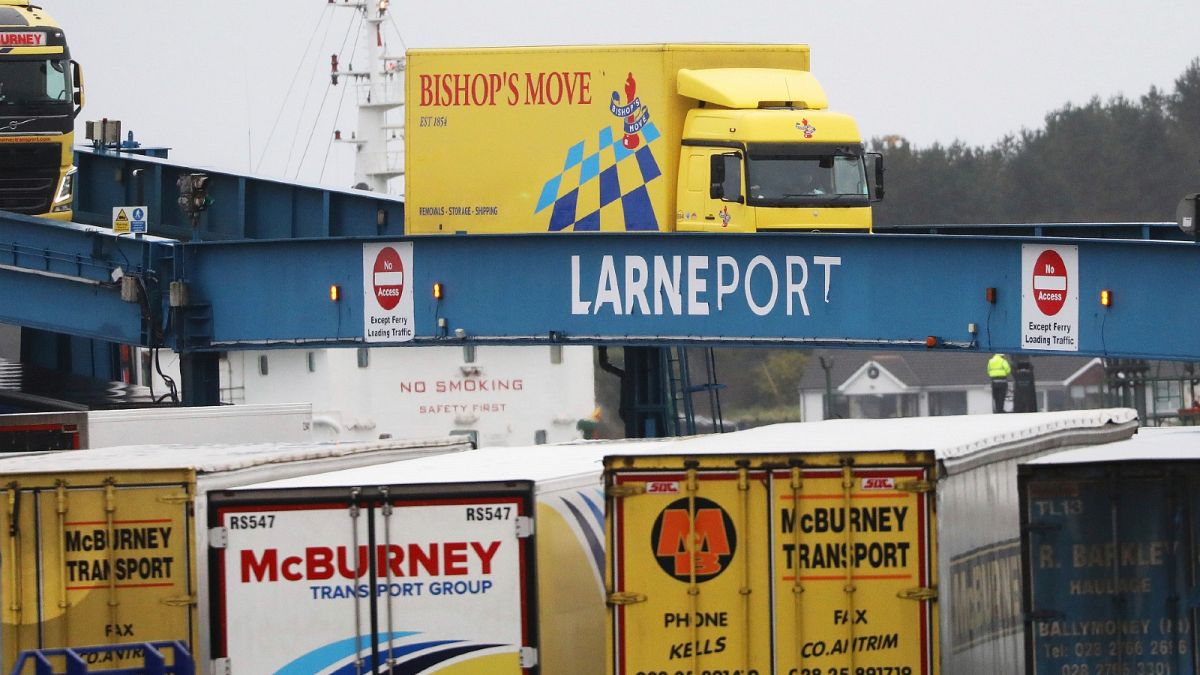It is unclear whether or not this order will be followed, with some within the DUP arguing that the administration is under a legal obligation to carry them out.
A judge in Belfast suspended an order by Northern Ireland’s agriculture minister to halt border checks on goods from the rest of the UK that were imposed under the Brexit agreement struck between the UK and the European Union.
High Court judge Adrian Colton made the interim order on Friday pending a full hearing into the legality of the decision by Agriculture Minister Edwin Poots. The hearing is expected to be held next month.
Brussels branded the order to stop post-Brexit controls on foodstuffs arriving into Northern Ireland from Britain as "unhelpful".
It represents another complication in a saga that has further soured relations between the EU and London.
Why are there border checks?
The effective entry into force of Brexit a year ago led to the introduction of controls on goods arriving in Northern Ireland from Great Britain.
The controls are designed to avoid the return of a physical border between the Republic of Ireland — still part of the EU's single market — and Northern Ireland, now outside the bloc as part of the UK.
The move has effectively put a border up in the Irish Sea between Northern Ireland and the British mainland, angering unionists who want to maintain links with London.
Who ordered the border checks to stop?
It was ordered by Edwin Poots, Northern Ireland's minister of agriculture. He represents the Democratic Unionist Party (DUP), which runs Northern Ireland’s power-sharing government with the Irish left-wing Republican party, Sinn Fein.
The DUP opposes the post-Brexit agreement known as the Northern Ireland Protocol and has threatened to quit the Belfast government rather than implement it — a move that would collapse the power-sharing administration.
Poots said he has taken "legal advice" on the matter and argues that the checks require the approval of the local executive, which is lacking.
It is unclear whether or not this order will be followed, with some within the DUP arguing that the administration is under a legal obligation to carry them out.
What has been the reaction?
"The European Commission has been working tirelessly with the UK government to address practical challenges related to the implementation of the Protocol," a spokesperson for the European Commission told Euronews.
"The decision by the Northern Irish Minister for Agriculture is therefore unhelpful. It creates further uncertainly and unpredictability for businesses and citizens in Northern Ireland.
"The European Commission will closely monitor developments in Northern Ireland pursuant to this announcement. It recalls the responsibility of the UK Government for the respect of the international obligations it has entered into."
Following talks with UK foreign secretary Liz Truss on Thursday, European Commission vice-president Maroš Šefčovič said Poots' decision was "being very unhelpful".
"It creates uncertainty and unpredictability for the people and businesses in Northern Ireland," he said.
"According to our information, officials in Northern Ireland continue to carry out checks on goods coming to Northern Ireland. It is essential that this remains the case. The European Commission will closely monitor the developments on the grounds."
Irish Foreign Minister Simon Coveney denounced a "violation of international law". "This is playing politics with legal obligations," he told senators in Dublin.
Northern Ireland's Deputy First Minister Michelle O'Neill, of Sinn Fein, denounced on Twitter a move by the DUP to "illegally interfere with national and international law".
What's the context?
This comes three months before crucial elections in May, when Sinn Fein, which favours a referendum on the reunification of the island within five years, is leading in the polls.
The controversial Northern Ireland Protocol is currently the subject of intense negotiations, with British Foreign Secretary Liz Truss having held the latest talks with European Commission Vice-President Maroš Šefčović in a call on Thursday.
Under pressure from unionists who have demanded progress by 21 February — the date of the next meeting of the joint UK-EU committee on the implementation of the Brexit agreement — the British diplomatic chief posted last week during a trip to Northern Ireland to make "significant progress" quickly.
